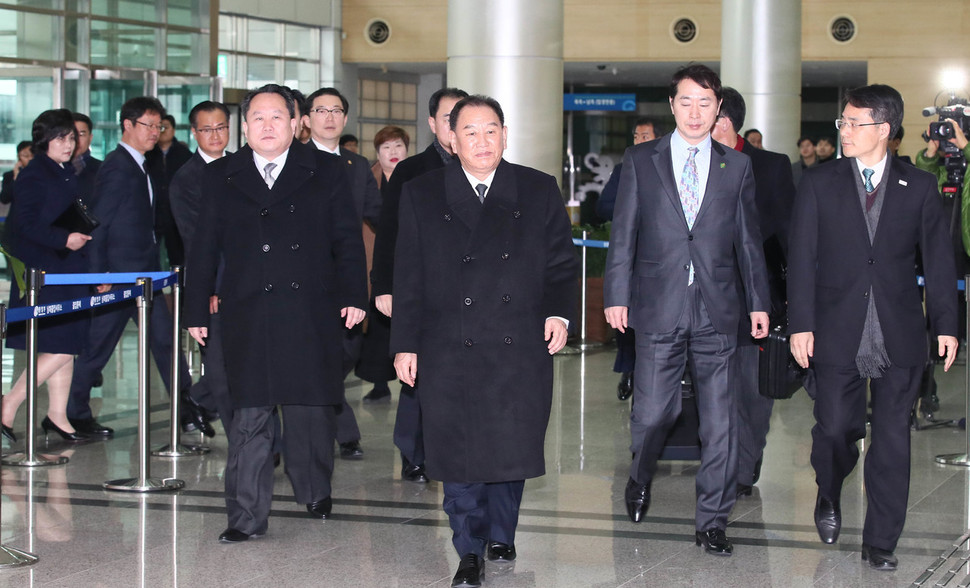 |
|
A North Korean high ranking delegation including Workers’ Party Central Committee vice chairman Kim Yong-chol (center) and chairman of the Committee for the Peaceful Reunification of the Fatherland, Ri Son-kwon (left) return to North Korea through the Customs, Immigration, and Quarantine (CIQ) at Dorasan in Paju, Gyeonggi Province on Feb 27. (Photo Pool)
|
South Korean playing mediating role in trying to arrange bilateral US-North Korean dialogue
A second high-ranking North Korean delegation headed by Workers’ Party Central Committee vice chairman Kim Yong-chol returned home around midday on Feb. 27 after a three-day South Korea visit. A second “reconnaissance campaign” by Seoul, Pyongyang, and Washington during the Pyeongchang Olympics also came to a close. The three sides are now expected to begin analysis of the respective positions as they prepare to move on to the next stage. “This was not a visit to reach an agreement with us about what the first stage is, what the second is, or what the third is,” a senior Blue House official told reporters after Kim’s delegation returned North. “This wasn’t a situation where Kim was able to decide anything here. He will return [to Pyongyang] and deliver an internal report,” the official added. “Their side also needs to get their position in order,” the official said. Kim and the other members of the high-ranking North Korean delegation returned home at around 11:55 am on Feb. 27 through Customs, Immigration, and Quarantine (CIQ) at Dorasan in Paju, Gyeonggi Province. The Blue House initially predicted Kim would bring a message from North Korean leader Kim Jong-un – including one about possible dialogue with the US. But during his visit, Kim Yong-chol merely reiterated Pyongyang’s position that it is “prepared for dialogue” with Washington. Instead, he focused on hearing from Blue House National Security Office director Chung Eui-yong and other South Korean officials about the US’s “true intentions” and listening in detail to President Moon Jae-in’s ideas for serving as a mediator between the two sides. “Kim met with President Moon in Pyeongchang, and he met with Chung Eui-yong, Minister of Unification Cho Myoung-gyon, and a number of others,” a senior Blue House official explained. “Certainly, they would have talked about the various conditions for North Korea-US dialogue and what stages we would have to go through to achieve it.” “The important thing is to see what North Korea’s thoughts are and convey the US’s position as we understand it. Those are the discussions that would have taken place,” the official continued. Kim Jong-un’s response will be a crucial factor in shaping the political situation What is clear is that the future message Kim Jong-un sends after hearing reports on Moon’s call for proactive positions from Pyongyang on denuclearization and dialogue with the US will be a crucial factor in shaping the Korean Peninsula’s political situation going ahead. Presidium of the Supreme People’s Assembly President Kim Yong-nam and other members of a high-ranking delegation that visited on Feb. 9–11 also reported to Kim on Feb. 12 on their activities in the South. At the time, North Korean news outlets reported Central Committee first vice director Kim Yo-jong as having “reported in detail on the South’s intentions and US activities as ascertained during the visit,” with Kim Jong-un presenting “specific directions for improvement and development in inter-Korean relations.” Kim Jong-un was also reported to have given “forceful instructions” to “establish working-level measures” to this end. The Moon administration also began analyses of Kim Jong-un’s position as relayed by Kim Yong-chol, who oversees North Korea’s policy toward South Korea and the US. “We also need to analyze the different things that we heard from the North’s delegation, and provide an explanation to the US when the analysis is complete,” a senior Blue House source said. While a senior Ministry of Foreign Affairs official is reportedly set to visit the US shortly, Seoul appears likely to first report the results of its discussions with Pyongyang to the US through diplomatic channels. Washington is also expected to decide its next move after hearing the position relayed by Kim Yong-chol and gauging the context of the North’s message. But with US President Donald Trump declaring on Feb. 25 that he would only have dialogue with the North “under the right conditions” and raising the threshold to “dialogue toward denuclearization,” the battle of nerves between Pyongyang and Washington is predicted to continue for the time being. By Kim Ji-eun and Seong Yeon-cheol, staff reporters Please direct questions or comments to [english@hani.co.kr]






